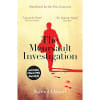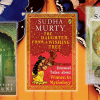Storytelling, struggles, and reimagining identity

Patriarchy would have you believe that women are inherently complicated—creatures who must be defined, boxed in, or reduced to stereotypes. In the technological age, social media only amplifies this, offering up an endless parade of idealised women, shaped by external expectations, each one conforming to society's narrow view of who they should be. But the true complexity lies not in these simplistic definitions, but in the myriad struggles women face every day. And I refuse to reduce this to the mere word "struggle," for all people encounter challenges.
Regardless of context, or the pain you feel in being a woman, or the knot that tightens at the back of your throat—writing, it seems, is the only true liberation. Whether you're telling your own story or of another, writing has the power to illuminate and heal.
Regardless of context, or the pain you feel in being a woman, or the knot that tightens at the back of your throat—writing, it seems, is the only true liberation. Whether you're telling your own story or of another, writing has the power to illuminate and heal.
Writers over time have shed light on how to navigate around some key tools of patriarchy. In it, they teach us how to combat the negativity that a largely male-controlled culture imposes on us women in the guise of being our saviour.
A Woman Looking at Men Looking at Women: Essays on Art, Sex, and the Mind
Siri Hustvedt
Simon & Schuster, 2016
Writing about women starts with a dismantling—a breaking away from the male gaze to reconsider how women are seen and represented. A Woman Looking at Men Looking at Women is a compass for this transformation. It weaves together art, philosophy, psychology, and literature, probing how identity is shaped by being observed. Hustvedt dives into the philosophy of perception, drawing from minds like Immanuel Kant and Maurice Merleau-Ponty to untangle how our inner worlds construct the meanings we attach to what we see.
Hustvedt doesn't just question traditional frames of thought; she dissects them, challenging the audience to explore how any gaze—male or otherwise—carves out definitions of identity. What makes this work exceptional is its ability to spin a mosaic of ideas that invite readers to push past the usual confines of understanding. How does she accomplish this? Hustvedt bravely folds her personal truths into her intellectual pursuits, creating work that is as raw as it is sharp.
For writers, this is a lesson in creative risk-taking. Hustvedt shows us what happens when we abandon silos, allowing disparate concepts to collide and spark innovation. By stepping into this space of possibility, writers can create work that not only challenges but resonates—work that forges connection while cracking open new ways of seeing.
Anthropocene Feminism
Richard Grusin (editor)
University of Minnesota Press, 2017
Anthropocene Feminism seeks to shed light on how exploitation is made. In an age dominated by human impact, the book asks tough questions, like how does the same system that exploits the Earth also oppress women? How can we shift from exploitation to care and responsibility? Additionally, the book reminds us that climate change and resource depletion hit hardest in marginalised communities, especially women. It urges writers to bring these voices to the forefront, to critique the systems—patriarchy, colonialism, capitalism—that perpetuate both gender inequality and environmental destruction, consequently, priming our systems to create an environment for exploitation.
This book pushes writers towards rethinking how we tell stories—moving beyond human-centric narratives, exploring the agency of animals, plants, and ecosystems. The writing advice that is perhaps at the heart of this book is weaving a connection into the heart of every narrative. The result is something that doesn't just critique the world as it is but helps to imagine what it could become.
Half the Sky: Turning Oppression into Opportunity for Women Worldwide
Nicholas Kristof and Sheryl WuDunn
Knof, 2009
Half the Sky by Nicholas Kristof and Sheryl WuDunn is the kind of read that grabs you by the shoulders and takes you straight into the lives of people who have endured and defied the worst the world can throw at them. The reader is introduced to complex characters in even more complex contexts, who are their own knights in shining armour and this is perhaps what sets the book apart.
Kristof and WuDunn don't offer any easy fixes to the problems that confront these very real people because there aren't any. Instead, they ask readers to grapple with the complexity. "How can you talk about gender-based violence without addressing poverty? How can you tackle poverty without looking at healthcare, education, and social norms?" they ask, and argue that solutions need to be holistic and context-specific.
For writers, this book serves as an important reminder—to never simplify messy realities. It compels you to explore nooks and crannies and acknowledge nuances, and helps you build an understanding that you don't need to spoon-fed the reader to handle complexity in your writing. Rather, it's in this messiness that the most meaningful insights emerge. Half the Sky jogs our memory with the simple fact: that stories are meant to transform, not just inform. So it works as an invitation to not just tell stories—but telling the ones that make people care. Isn't that the point of writing, after all?
Nazifa Raidah is a journalist, researcher and an ex-avid reader. 'Ex' because capitalism won't let her read.

 For all latest news, follow The Daily Star's Google News channel.
For all latest news, follow The Daily Star's Google News channel. 






Comments